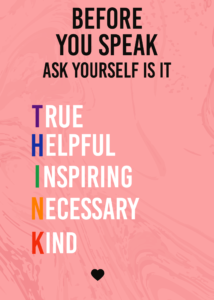This essay was generated using AI from a prompt from Maiamama. We actually had a robust back and forth trying to get the AI to write the essay from a non-white viewpoint and it refused. So please enjoy this essay written from the viewpoint of a white person!
Using Our Voices Wisely: Applying the THINK Acronym to Discussions About Race
The acronym THINK is a powerful tool that can help individuals communicate more effectively and improve the quality of their interactions with others. The word “think” can be broken down into five distinct parts:
T – is it True?
H – is it Helpful?
I – is it Inspiring?
N – is it Necessary?
K – is it Kind?
As a white person, it’s important to be mindful of our words and actions when discussing race. Racism and systemic discrimination are deeply ingrained in our society, and as members of the dominant group, we have a responsibility to listen to and amplify the voices of those who have been directly impacted by these issues.
Before commenting about race, we should apply the principles of the THINK acronym. The first question is whether what we’re about to say is true. In the context of race, this means considering whether our words are based on factual information or whether they’re perpetuating harmful stereotypes. It’s important to recognize that our experiences and perspectives are not universal, and that our understanding of race may be limited by our own biases and privilege.
The second question is whether our words are helpful. In the context of race, this means considering whether our words are contributing to a constructive conversation or whether they’re harmful to the cause of racial justice. It’s important to acknowledge that we may not have all the answers, and to approach discussions about race with a willingness to learn and grow.
The third question is whether our words are inspiring. In the context of race, this means considering whether our words are motivating others to take action or inspiring them to think differently about a particular issue. By sharing personal stories and experiences, we can help others to better understand the impact of racism and discrimination and inspire them to become advocates for change.
The fourth question is whether our words are necessary. In the context of race, this means considering whether our words are contributing to the conversation in a meaningful way or whether they’re simply adding noise. It’s important to recognize that our voices may not always be the most important or relevant in discussions about race, and to prioritize the perspectives of those who have been directly impacted by racism and discrimination.
Finally, we should ask ourselves whether our words are kind. In the context of race, this means considering whether our words are being received in a way that shows empathy and respect for others. It’s important to recognize that discussions about race can be emotional and difficult, and that our words can have a profound impact on others. By using inclusive language and avoiding discriminatory language and hate speech, we can help to create a more positive and respectful conversation about race.
In conclusion, as a white person, it’s important to approach discussions about race with humility, empathy, and a willingness to learn. By applying the principles of the THINK acronym and considering whether our words are true, helpful, inspiring, necessary, and kind, we can contribute to a constructive conversation about race and work towards a more just and equitable society.

